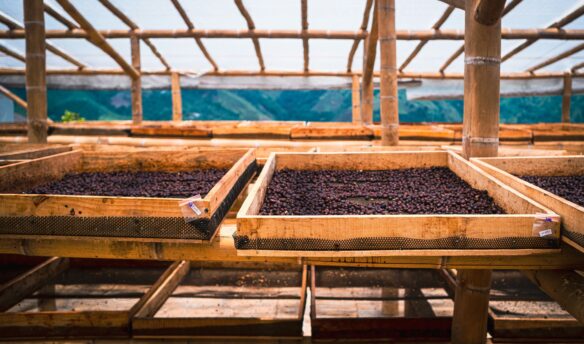Hello and welcome to the Coffee News Club, a weekly summary of top coffee news.
A dour coffee forecast from Vietnam; Starbucks allegedly withheld raises from unionized workers; and the government of Papua New Guinea announced a new post: minister for coffee.
Let’s take a look at this week’s news.
‘Coffee Lovers Set for Price Pain as Vietnam Reserves Shrink’ – via Bloomberg
In Brazil, farmers reported significant losses of coffee cherries due to frost and drought, with some anticipating a reduction of up to 40% of their harvest. Now, Vietnam’s robusta reserves are dwindling, and output forecasts are shrinking.
Robusta prices have jumped 17% in the last five weeks. With consumption patterns returning to pre-pandemic levels and inflation increasing the desire for cheaper coffee, robusta has never been more popular. However, supply may not be able to keep up with demand.
According to a Bloomberg survey of coffee traders, robusta stockpiles in Vietnam will halve by the end of September compared to where they were a year earlier, caused by increased exports as supply chains and demand improve.
Projections for the upcoming harvest in Vietnam are also gloomy, with higher than average rainfall forecast when the harvest begins in October. A lack of fertilizer could also negatively impact next year’s crop.
The article includes a sobering rundown of the current crises facing coffee producers worldwide. In addition to the issues affecting Brazil:
“Colombia is struggling to recover from crop-damaging rains, while Honduras, Guatemala and Nicaragua are running out of supplies from the 2021-22 harvest. Costa Rica’s next-season crop is showing signs of stress, and a drought has cut robusta yields in Uganda.”
Rather than one-off flukes, these cumulative shocks of climate breakdown, inflation instability, and an increasing gap between demand and production continue to threaten the entire global coffee supply.
‘Starbucks Illegally Withheld Raises from Union Workers, Labor Board Says’ – via the Washington Post
According to a new complaint filed by the National Labor Relations Board (NLRB), Starbucks illegally withheld raises and benefits from unionized workers. Starbucks denies the allegations.
The NLRB said the move was intended to discourage unionization and seeks back pay and benefits for affected workers. It also wants CEO Howard Schultz to read a statement to workers about their union rights.
Organizers recognize the importance of the labor board’s complaint. “This is a historic triumph for democracy and the rule of law that a billionaire CEO must apologize to employees for abusing them and violating their rights as well as making them whole,” said Richard Bensinger of Starbucks Workers United.
Starbucks has raised pay and benefits for nonunion employees while declaring they legally cannot offer the same to unionized workers without bargaining. “We’ve been clear in that we are following NLRB rules when it comes to unilaterally giving benefits,” Starbucks said in an email.
Unless Starbucks settles the case, an administrative law judge will decide the matter at a hearing in October.
‘Papua New Guinea Brings in Minister for Coffee’ – via the Guardian
Papua New Guinea’s prime minister has announced a cabinet that includes a coffee minister, a world first.
Joe Kuli is a new member of parliament (MP) for the central highlands region, and his focus will be “coffee, coffee, and coffee,” according to recently re-elected prime minister James Marape. CNN also quotes the prime minister as saying, “He’s now given the task of just sleeping, talking about coffee, waking, talking about coffee.”
Coffee accounts for 27% of Papua New Guinea’s agricultural exports and 6% of GDP while supporting nearly two million people across the country.
After an election earlier this month marred by violence and allegations of voter fraud, Marape said the government is committed to expanding important agricultural industries such as coffee and palm oil. “Agriculture is where the government can have the greatest impact in terms of the population of this country, because the bulk of our people are subsistence farmers. We have land and we must encourage our people to go into agriculture production.”
Deforestation for palm oil plantations and commercial logging is still a big problem in Papua New Guinea. A Global Witness report in 2021 uncovered violence and human rights violations caused by suppliers working with multinational corporations. In some instances, smallholder coffee farms were bulldozed to plant oil palm. Nearly 85% of the country’s coffee is grown by such small-scale producers.
More News
‘Featuring Roasters Galore, the No Filter Coffee Fest is Coming to Charlotte’ – via Daily Coffee News
‘Young Baek of Ona Coffee wins Australian Cup Tasters Championship’ – via Bean Scene Magazine
‘Moccamaster Teams Up With Iconic Streetwear Brand Supreme’ – via Sprudge
‘One Small Batch at a Time, Fiddlehead Coffee Has Raised $60K+ for Ukraine Relief’ – via Daily Coffee News
‘Mayor Tells People to Avoid Coffee Shop Because Name ‘Cheapens’ his Alabama City’ – via Miami Herald
The Week in Coffee Unionizing
- That thing Starbucks said about not being able to offer raises and benefits to unionized workers without bargaining? According to Vox Recode, the company has only begun the process of bargaining—or drafting a union contract—at only three out of more than 200 unionized stores. Even though hundreds of Starbucks locations around the US have won their union vote, the union still needs to sit down with the company to draft a contract and lay out the terms of their employment, including pay, benefits, and other conditions. Workers say their requests to begin bargaining have been largely ignored and accuse Starbucks of delaying to weaken and dilute the union movement. The company denies this.
- Starbucks announced the closure of two more unionizing stores in Seattle, WA, and Kansas City, MO. As Starbucks Workers United points out, of the 19 stores closed over the past few months, 42% engaged in union activity while representing just 0.2% of the company’s corporate-owned US stores.
- Workers at Sunergos Coffee in Louisville, KY, announced their intent to unionize on Thursday. “We are united by our love and mutual respect for one another,” the statement reads in part. “We want to build a union centered on a commitment to one another and to our craft in which we take great pride.” According to its website, Sunergos has four cafes and a roastery and employs nearly 50 people.
Is Coffee Good For You?
Not if you prefer hot coffee to cold brew.
According to a new study from the University of Cambridge, consuming hot coffee or tea can almost triple your risk of throat cancer.
Researchers looked at data from over half a million people in the UK Biobank, an extensive biomedical database and research resource. They found that people who drank coffee and tea were 2.8 times as likely to develop esophageal cancer than non-drinkers.
The study, published in the journal Clinical Nutrition, also asked participants how they liked their beverage: “warm,” “hot,” or “very hot.” Those who said “hot” had a 5.5-fold increase in risk, with a 4.1-fold increase for “very hot” drinkers.
But rather than finding something within coffee or tea that caused the increase, the researchers posit that it is a case of hot liquid damaging the throat. “It seems to be that thermal injury is the most plausible hypothesis,” study author Dr. Stephen Burgess told the Telegraph. “That would explain why we’re seeing evidence of effect even in coffee non-drinkers who we assume would be tea drinkers.”
Dr. Burgess did have better news for hot coffee fans: the study found no increased risk from other cancers. “I think overall it’s good news for coffee drinkers that actually coffee was not associated with most forms of cancer and certainly the most common forms of cancer,” he said.
Beyond the Headlines
‘Gimme! Coffee: Tale of a Union Unraveling’ by Jimmy Jordan
‘Welcome To The Golden Age Of Coffee And Board Games’ by Jenn Chen
‘Inflation Continues to Hammer Coffee Workers in the US’ by RJ Joseph
Coffee News Club is written by Fionn Pooler and the Fresh Cup editorial team.
















